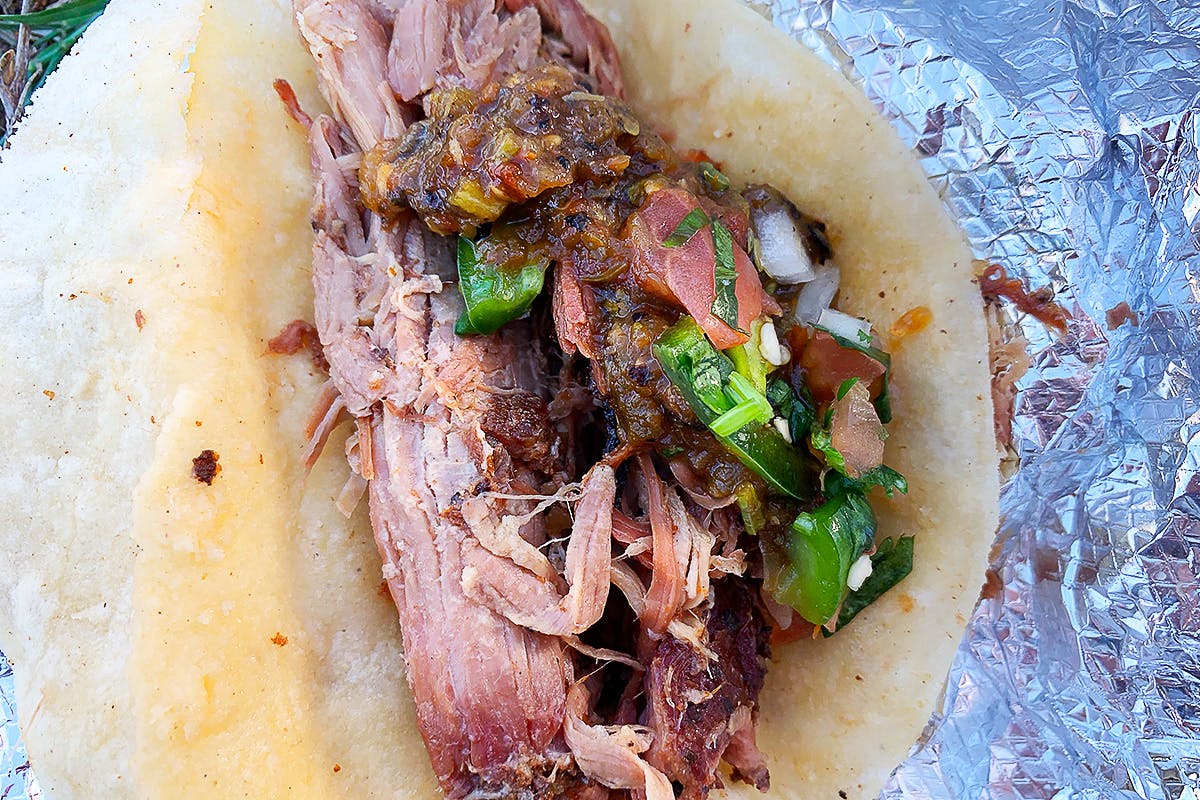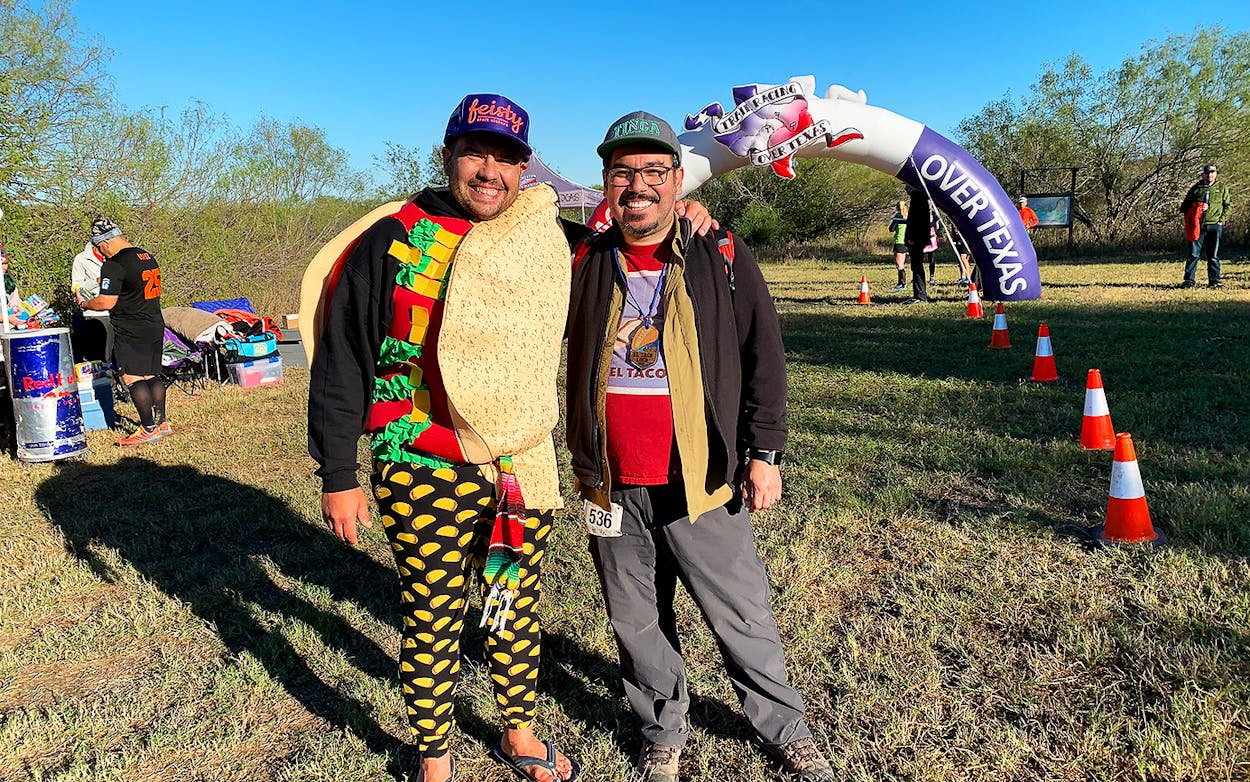The text messaging was relentless. There was a photo of a foam trucker hat that had a taco over the embroidered words “El Taco Loco” and a link. There was pic of a black T-shirt with the words “Tacos & Trails & Texas & TROT.” And many more like that. They were all sent in May by my wife, Jessie, from her volunteer position at the Possum’s Revenge Trail Race, an annual run hosted by Trail Racing Over Texas—the TROT on the shirt—on the banks of Possum Kingdom Lake, in Graford. Jessie was trying to persuade me to sign up for TROT’s El Taco Loco, a taco-themed trail race that took place this past weekend at San Antonio’s Land Heritage Institute.
Her ploy worked—after all, they were serving tacos at the end of the race. But I did it on my terms. I would not be doing the 100k, 50k, 25k, or 10k routes. I would do the shortest one—5k—and I wasn’t going to train for it. In fact, I wasn’t going to run at all. As a staunch believer in the wonders and benefits of hiking, I would hike the 3.1 miles—trekking poles, boots, and all. And I would get a story out out of it—I imagined a silly, straightforward first-person narrative about being dead set on coming in last in a race in the woods with bad tacos.
But this is more of a meditation on self-discovery, one that’s as winding as the Land Heritage Institute’s 20-mile trail system over meadows and along the Medina River. Going in, I thought trail running was a sport for masochists who, after running long distances, love nothing more than to complain about how badly their big toe was bent and how that fall through the deep, muddy puddle left their leg bloody. “Trail running is about bragging rights,” I once declared.
I was wrong. I was also right.
Yes, I did my best to stray from the flagged path if something striking caught my eye. When I noticed what looked like a sliver of a creek running several feet from the trail, I didn’t hesitate to walk to its bank while keeping an ear out for the sound of a rattle that never came. Instead, I was treated to the quiet movement of the water, the aroma of wildlife scat, and an evaporating chill. I took photos of deer tracks. I took photos of hills that rose like waves around trees. I detoured into a barn when I caught sight of a decrepit once-covered wagon on a historic homestead and read interpretative park signs about the Cart War of 1857. They recounted Anglo violence against Tejano freight haulers and quoted Texas Governor Elisha M. Pease’s words to the state legislature that year: “It is now very evident that there is no security for the lives of citizens of Mexican origin engaged in the business of transportation, along the road from San Antonio to the Gulf.” The hostilities ended only after U.S. Secretary of State Lewis Cass argued for the protection of the embattled Latino workers. Despite my best efforts, I did not get lost.
Trail running “was a way to lose weight and then also make a transition, at least for me, of being sober,” Rob Goyen, TROT’s founder and co-owner, tells me over the phone a few days after the race. “It’s always been a really good tool for me to remain sober. The runner’s high was a good substitute for getting high, per se.” Goyen started running in 2011 and became sober in 2012; two years later he had become so entrenched in the sport that he decided to sell his share of a tax business and establish Trail Racing Over Texas. “There was a good community that made me feel like I owed it to them as well. So, it gave me a lot of purpose.” TROT now hosts up to twenty races annually, including the summertime Habanero Hundred, which Goyen says some people call “the toughest ultra in the South.” It attracts up to seven hundred participants.
When I ask him about people’s tendency to run ultra-distance trail races and then complain about what they just did to their bodies, only to get excited about the next race, Goyen answers frankly. “It’s a common phrase: ‘I’m never doing this again. I don’t want to do this. I can’t walk.’ And I always go ‘OK, I know you’ll sign up for something on Monday.’ And they’ll go, ‘No, I won’t.’ And then by Tuesday, they signed up for another race.” But Goyen admits to urging moderation. “I’ve also been on the end of trying to guide some people that I see run all the time to not run all the time. … This isn’t a do-or-die sport.”
Despite his own knee surgeries and an osteotomy—a procedure where doctors deliberately break a person’s bone or bones to correct alignment—Goyen is committed to trail running. It’s helped get him through a rough couple of years; after heartbreaking infertility issues (“I knew I had to be strong for [my wife]”), he and his wife welcomed a baby ten months ago. “I’m very honest about the things I’ve been through. For me, the only way to be happy and to be peaceful and righteous is to live on one side of that line.”

Back on the trail at the race, two women wearing exercise leggings and fleece jackets and sporting Camelbak hydration backpacks occasionally crossed my path. They said they also preferred to hike the trails. One was using trekking poles too. As we chatted for a bit along the muddy ground, I started to understand that trail racing was more than I had considered. All along the trail, there were a lot of “good mornings” and words of encouragement from experienced racers running the 100K. Eventually, I caught myself voluntarily saying things like, “You got this! Keep going, bad ass!” I had come around, you could say. Frankly, it was pretty cool. And yet, I still managed to come in dead last in the 5K. I got a high-five from Goyen, who was dressed in taco-print leggings and an off-the-rack taco costume (what other kinds are there, really?), and I got in a quick photo with him before he darted off to encourage racers and pitch in where he was needed.
“Our community is not competitive,” Goyen later tells me. “While there are people who run to win, we [at TROT] don’t put a very large focus on who wins the races and give them all the glory because, for lack of a better term, we don’t really care. This is a sport for everyone. I want to highlight everybody that runs our races. I want to treat them the same. This is a sport where men and women are treated the same. They start the same. They get the same prizes. Women often beat men. It’s not uncommon to see. We get a lot of people that come in our races that are of different ethnicities or sexual orientations, and it’s our job as a race company to make them feel safe. People feel like they can dress up how they want to. People feel like they can be themselves.”
Speaking of identity, let’s get back to tacos. The prize for finishing 100K was a belt buckle that could hold a crispy taco.“People flew from Virginia and Washington state to run El Taco Loco just because they really love tacos,” Goyen says. “I asked a guy, ‘What are you doing here?’ And the guy said, ‘I love tacos.’” (To be fair, people also fly across the country to participate in Possum’s Revenge just because they love possums and want the possum buckle and medal. “People love what they love,” he says.)
The tacos weren’t ready by the time I had strolled across the finish line. It would be an hour before the caterer Two Step, a Mexican restaurant in San Antonio, would be ready to serve the crowd their three options: pork, brisket, and squash/bell peppers. The trio of pork and brisket (smoked over a combination of mesquite and white oak) and grilled veggies were wrapped in commodity tortillas that cracked quickly. The pork was the better of the two meat options; smokier in flavor and aroma, it bore dark strips of skin. The brisket, unfortunately, had its bark removed, but the charred salsa roja with its amped up fruity flavor and mild spice worked well enough.
When I tell Goyen later that I had scrapped my assumed narrative, he welcomed me into the fold. “I’m glad that you were a skeptic coming in. And I also like the fact that that it changed you enough for you to have a different perspective, because trail running is a very cool organic place that everyone’s included in. And that is the ultimate goal: to make people feel like they’re part of the family when they step in. And if you’ve got some of that, then I feel like we’re doing something right.” In that way, trail running is like tacos, a welcoming space where we can all come together.
And yes, I’m going to do another El Taco Loco next year—and that’s not all. One of the highlights for me this weekend was exploring the Land Heritage Institute’s stretches of the National Historic Trail-designated El Camino de los Tejas, the Texas network of commercial and empire-expanding roads built by the Spanish that begins in Laredo. Wagon wheel ruts from the byway’s heyday are reported to be intact hundreds of years later; I had hoped to see some. So when I found out that TROT also hosts a Mission Tejas Trail Run at Grapeland’s Mission Tejas State Park, which is also on the El Camino, I decided to run that race, too (it’s in September). Maybe I’ll even challenge myself with a 10K. (Dear Jessie, don’t hold your breath.) I’ll probably train for that one—something beyond the arm curling it takes to raise a taco to my mouth.
- More About:
- Tacos
- San Antonio








